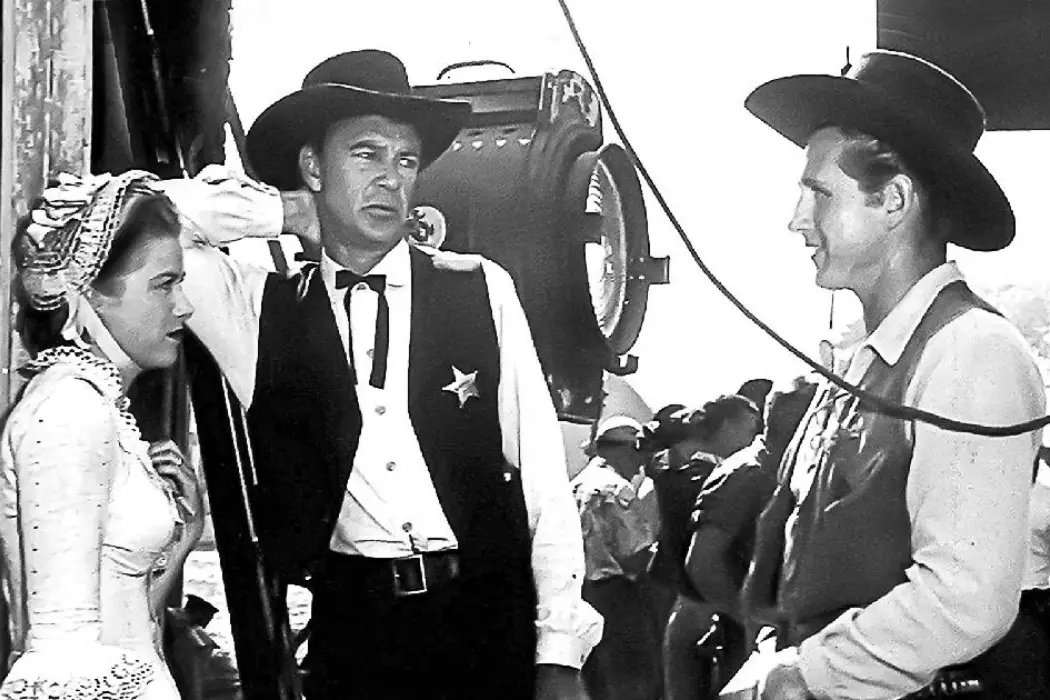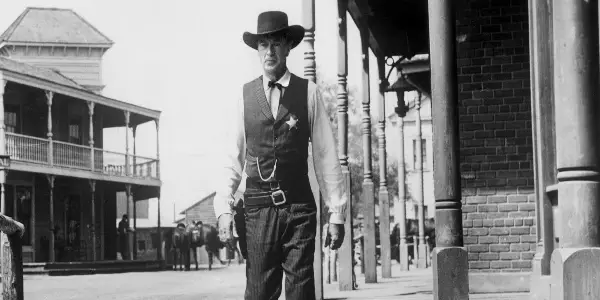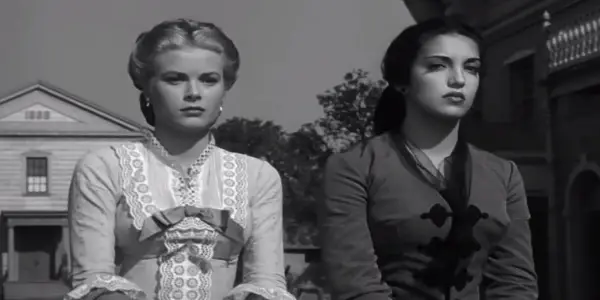Interview With Director John Mulholland Of INSIDE HIGH NOON

Tynan loves nagging all his friends to watch classic movies…
2022 commemorates the 70th anniversary of High Noon, the beloved western lauded as the 33rd greatest movie of all time by the American Film Institute. We spoke with writer, director, and historian John Mulholland about the movie and his documentary, Inside High Noon, which recently premiered on PBS.
Tynan Yanaga for Film Inquiry: How did you get attached with the documentary and did you have a personal relationship with High Noon beforehand?
John Mulholland: I became involved with High Noon because I remember the first time I saw it when I was very young and how impressed I was with Gary Cooper‘s performance! I just found it so layered. I was fascinated how when he was with the group of the townspeople or anyone else, there was this stoic masculine facade where no vulnerability was shown – no sense of weakness. And then, when he was alone, it struck me that he was a totally different person. It was a second performance. He was, sensitive, vulnerable, afraid.

Even when I was young, I understood you don’t show this. I just found that startling in an era of John Wayne that a man would show this side of him, that he was afraid, that he was bitter. I remember being struck when he puts his head down on the desk and cries.
Even today, I’m not sure how many male actors would do that because their character is afraid, and they know they’re going to die. I’m sure that DiCaprio might, but for the most part, it’s still a startling moment among masculine behavior in Hollywood.
From there I eventually learned about the Blacklist, and how nine people involved with the film were blacklisted, including not just the screenwriter Carl Foreman, but the cinematographer, Floyd Crosby. You’re very young, but there was a musician actually still alive named David Crosby.
Ah, yes, from The Byrds.
Yeah, and Crosby, Stills, and Nash. And he’s Floyd Crosby’s son, and he’s talked about the bitterness he felt about how his father was blacklisted. The whole backstory seemed to mirror what was happening on screen. So it just kept building.
Some people might not know that much about the Blacklist. Could you explain what it was, and how it related to the story of High Noon?
John Mulholland: Sure. I’m sure that few people under forty understand what the Blacklist was. It was a period after World War II when our ally, Russia, on a dime, turned to being our enemy.
Conservatives, especially in the American government, took off after artists – those in the creative community – for what they perceived to be their sympathy for Russia. They used what they had created, as writers, directors, and actors to link them to Communism.
I personally think they went after mostly people of Jewish background. You go through the actors, the writers, the directors, and almost inevitably there’s the “taint” of being Jewish. It’s a shameful period in our history because it’s one we’ve never fully spoken about and come to grips with. So many lost their livelihoods – never worked again. Some committed suicide. Some died of heart attacks like John Garfield.
And Carl Foreman, the screenwriter of High Noon, had been a member of the Communist party in the late ‘30s. The world seemed to be falling apart, so Communism looked to be something that was working under Stalin, even though we didn’t really understand what Stalin was doing.
Many gave names, and they’d be allowed to work. Foreman refused to name names, and he was blacklisted. He ended up going to England and Cooper himself helped him get work, serving as a go-between where Foreman was uncredited.
He later wrote Bridge on the River Kwai, which went on to win the Academy Awards for Best Picture and Best Screenplay. Pierre Boulle, who wrote the novel – and the novel was written in French, then translated to English – he couldn’t speak English, and he was listed as the screenwriter. He ended up winning the Academy Award.

In the documentary, you make the distinction that Cooper was a staunch conservative, but he stood up for Foreman. Do you have any idea why he chose to do this?
John Mulholland: Even though he was a conservative, I’m not sure being called a conservative was what it means today.
For example, in 1938 Cooper’s father-in-law, Paul Shields, who was a liberal and an economic advisor to President Roosevelt, was sent to Germany to investigate its war machine and see what he could find out. Shields asked Cooper if he would go with him, and kind of serve as a Trojan horse.
He would open doors that Shields couldn’t, and Cooper was told not to do it. But Cooper said, No, I’ll go, and did open doors, and then came back and was being nailed as a fascist for having met Hitler, which he hadn’t done.
But I’m not sure that political parties, or even a political stance, meant as much to Cooper as loyalty to those around you whom you consider a friend.
He felt Foreman had written a terrific script, and, therefore, his name deserved to be on there, and when Stanley Kramer said I’m taking his name off, Cooper went to Kramer and said if you take his name off, I’m walking. You don’t have a movie.
In the late forties a singer-actress named Lena Horne who was black, was trying to buy a house in Beverly Hills, and all the liberals were lining up against it, and there was a list going around, and they got to Cooper’s house.
His wife Rocky answered the door and said, Could I have a copy of this list before I sign? And she looked over the list and every name that wasn’t on it, they invited and had a welcoming party for Lena Horne – Gene Kelly, Humphrey Bogart, etc.
I hadn’t realized Joseph Losey was the original director before he got blacklisted and before Fred Zinnemann took over. You also mentioned how it seems like many of the people on the Blacklist were Jewish. I was wondering if there was anything specific Zinnemann brought to High Noon?
John Mulholland: I think so very much. In fact, a lot of his family was lost in the 1930s during the Holocaust. He looked at how Europe stood aside as first Czechoslovakia was attacked by Germany and France and England did nothing.
By not standing up to Hitler at the beginning, it allowed Hitler to grow more powerful, and Zinnemann saw in the script of High Noon something that portrayed this. The town of Hadleyville has a chance to stand up to Frank Miller (Hitler) and stop him.
Only one man sees the danger. If you stand aside here and let this man in, this town is going to die. I’m sure he saw in the script of High Noon a perfect synthesis of what he felt had gone wrong in Europe in 1939-40 that had allowed the Holocaust.
There are a lot of other performers like Grace Kelly or Katy Jurado that I really appreciate in High Noon. Is there a particular performance that you would like to highlight?
John Mulholland: Well, I don’t disagree with you about Kelly and especially Katy Jurado. She could not speak English. That was her first English-speaking role, and she had to literally memorize the lines. Her performance is so layered, and she is the only other one for me in the town who understands that if you don’t stand up to Frank Miller, this town is going to die, and she, in fact, says that to the deputy.
These two roles have agency. They exist outside of the male lead; they have their own sequences. They have their own concerns that aren’t specific to Will Kane. Jurado admits the racism involved in the town. None of that has anything to do with the male lead. Too often women’s roles, especially if they are supporting, merely serve as a backdrop for the male character.

I find it interesting how the Helen Ramirez character originally had been linked up with Frank Miller, then she linked up with Will Kane, and now she’s linked up with the young deputy. She understood how perilous it was for a woman alone in a town like that, and she’d better link up with the powerful people.
And that’s all underneath. There are layers there, but it’s left for the viewer. It’s like a Hemingway short story where everything is – you know Hemingway’s thing of seven-eighths of an iceberg is underwater and that’s the way the characters are in this movie.
You mentioned Hemingway, and I believe you did a documentary on Gary Cooper and Hemingway.
John Mulholland: Yeah, I happened to find out that they were each other’s best friends the last twenty years of their lives, and I just thought, given the public personas of the two of them – Hemingway, is this hard-drinking, boasting, tough guy, and Cooper, this quiet, understated, hick cowboy, I just said, how could they possibly be friends?
That seems maybe like another generational example where people who are very different can still connect with one another.
John Mulholland: Yeah, possibly so. I wonder if perhaps that could really happen today.
It’s been seventy years since High Noon came out, and it’s still beloved by a lot of people. Why do you think that is?
John Mulholland: I think it speaks to each generation in a different way, but I think it speaks today because at its heart, it’s about civic complacency, and I think, again, what America is facing right now is a dangerous dose of civic complacency.
Is there anything, either a lesson or some hope, that we can take from Gary Cooper? And then from the Marshall in High Noon?
John Mulholland: Yes, certainly. I think that America can learn an awful lot from Will Kane. From the character and from what Gary Cooper did. As Foreman said, “He was the only big one that tried.” And that wasn’t easy because Cooper’s career, for the first time in a decade, had dropped off the top ten list of actors.
Still, he put his career on the line. It’s not easy to stand up and be counted. But I think it’s important to acknowledge what Gary Cooper did behind the scenes standing up for what he felt was right, which is what Will Kane does too.
I feel like that’s a good place to end. I really appreciate it.
John Mulholland: Well, thank you so much for your time.
Film Inquiry would like to take John Mulholland for taking the time to speak with us!
Inside High Noon first premiered on PBS on November 1st. This interview was edited for length and clarity.
Does content like this matter to you?
Become a Member and support film journalism. Unlock access to all of Film Inquiry`s great articles. Join a community of like-minded readers who are passionate about cinema - get access to our private members Network, give back to independent filmmakers, and more.
Tynan loves nagging all his friends to watch classic movies with him. Follow his frequent musings at Film Inquiry and on his blog 4 Star Films. Soli Deo Gloria.













